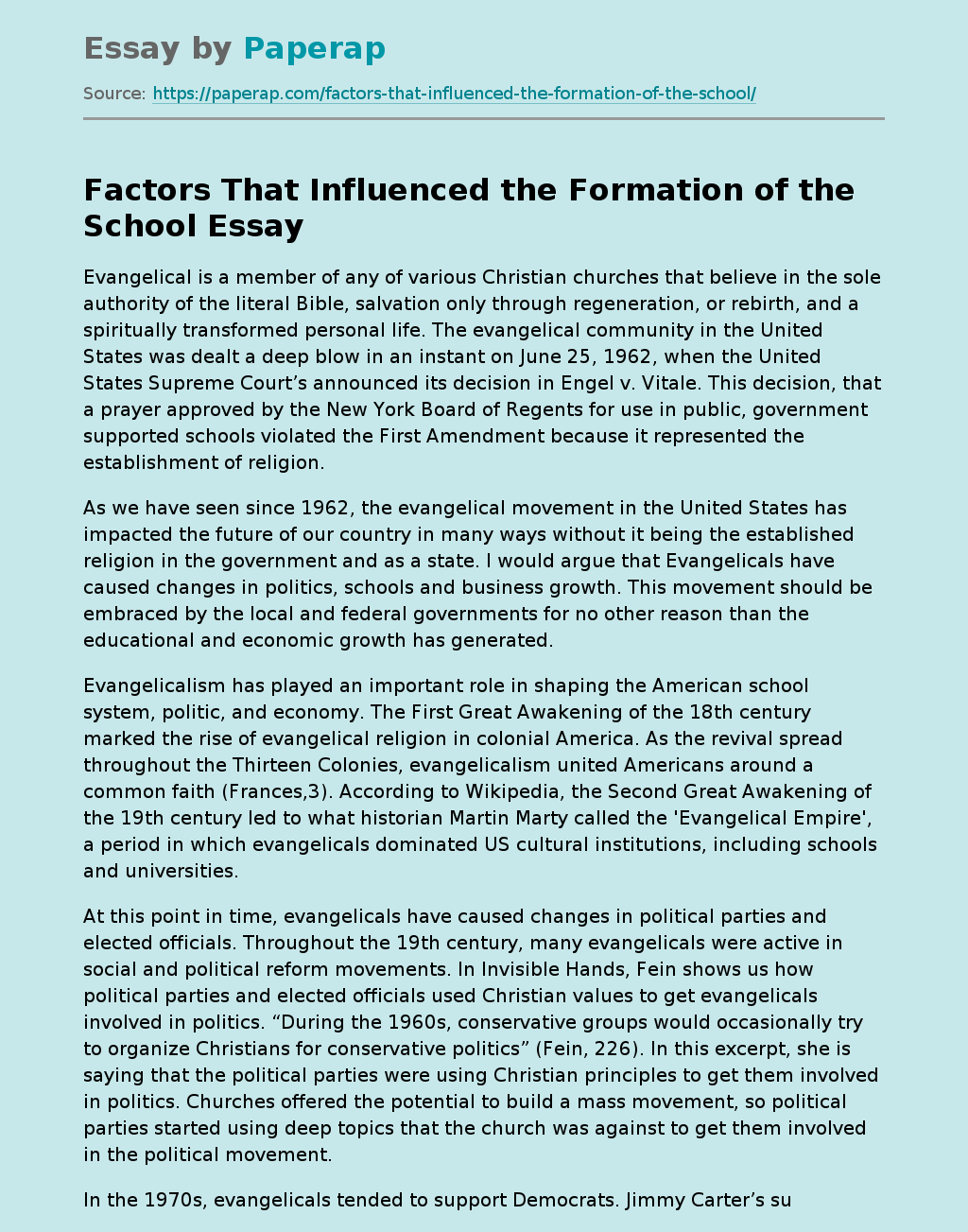Factors That Influenced the Formation of the School
Evangelical is a member of any of various Christian churches that believe in the sole authority of the literal Bible, salvation only through regeneration, or rebirth, and a spiritually transformed personal life. The evangelical community in the United States was dealt a deep blow in an instant on June 25, 1962, when the United States Supreme Court’s announced its decision in Engel v. Vitale. This decision, that a prayer approved by the New York Board of Regents for use in public, government supported schools violated the First Amendment because it represented the establishment of religion.
As we have seen since 1962, the evangelical movement in the United States has impacted the future of our country in many ways without it being the established religion in the government and as a state. I would argue that Evangelicals have caused changes in politics, schools and business growth. This movement should be embraced by the local and federal governments for no other reason than the educational and economic growth has generated.
Evangelicalism has played an important role in shaping the American school system, politic, and economy. The First Great Awakening of the 18th century marked the rise of evangelical religion in colonial America. As the revival spread throughout the Thirteen Colonies, evangelicalism united Americans around a common faith (Frances,3). According to Wikipedia, the Second Great Awakening of the 19th century led to what historian Martin Marty called the ‘Evangelical Empire’, a period in which evangelicals dominated US cultural institutions, including schools and universities.
At this point in time, evangelicals have caused changes in political parties and elected officials.
Throughout the 19th century, many evangelicals were active in social and political reform movements. In Invisible Hands, Fein shows us how political parties and elected officials used Christian values to get evangelicals involved in politics. “During the 1960s, conservative groups would occasionally try to organize Christians for conservative politics” (Fein, 226). In this excerpt, she is saying that the political parties were using Christian principles to get them involved in politics. Churches offered the potential to build a mass movement, so political parties started using deep topics that the church was against to get them involved in the political movement.
In the 1970s, evangelicals tended to support Democrats. Jimmy Carter’s successful presidential campaign in 1976 connected well with evangelicals who were growing more active on individual political issues but were not particularly active in party politics. Carter, a Southern Baptist Sunday School teacher, spoke often about his faith and described himself as “born again.” During the Carter presidency, however, evangelical support began moving toward the Republicans. Overall, evangelicals became more involved in politics throughout the history of the United States (Fein, 236).
Uniquely, Evangelicals are responsible for the changes in the school and educational system. As we approached the 21st century, the public school system began to show its age in desegregation and prayer band. More and more children began to fall behind in a rapidly changing environment marked by the introduction of personal computers and later the internet causing more kids to be left out in the educational system. The U.S. Supreme Court has replaced “freedom of religion,” guaranteed by the Constitution, for freedom from religion. To ban school prayer diminishes the religious freedom of students who would like to pray and forces them to act according to the dictates of a non-religious minority. Nowadays, schools in America don’t have prayers anymore.
Kim Phillips-Fein, the author of Invisible Hands, discusses the role of evangelicals in changing school systems in the United States. One year after Brown v. Board of education, Helms`s said, “we are far from convinced that public schools are the only way to make education available to our people” (Fein, 222). In this excerpt, she is saying that we should have something other than public school for our children. Consequently, this caused the expanding of private schools and the separation of equal opportunity for education in America. The American college/university was a Protestant enterprise. Harvard, Columbia, Yale, and Princeton were all founded to educate Protestant ministers and the men who would sit in the chair of their churches. These schools are now considered the most prestigious school in the country. Therefore, I assume, based on the information above, evangelicals had an important role in changes in the school system in the United States.
Above all, Evangelicals have brought a lot of business growth in the United States economy. By the 1950s, the churches had become the natural allies of the businessmen. The businessmen and churches could work together, the alliance between them also required the suppression and avoidance of deep conflicts, even before its birth. We had different kinds of people using churches as business and getting rich while taking from the poor. Lisa McGirr, the author of The Origins of the New American Right, discusses the importance of evangelicals in the new social issues. “Calvary Chapel not only became a multi-million-dollar venture in its own right, but it also founded large business enterprises” (McGirr, 248). In this excerpt, she is saying that the chapel wasn’t only a church but a business place. By the 19th century, many Protestants had sacral capitalism as they had the nation itself and many aspects of American culture. They believed that God had ordained capitalism and even who would succeed or fail on the battlefield of economic competition. For example, in 1978, Maranatha music, which was founded as a nonprofit ministry of Calvary Chapel in 1971, had become a well-established record company selling more than 500,000 records and cassettes in that year alone. As has been noted, this shows how much money we are bringing into the economy.
Factors That Influenced the Formation of the School. (2021, Dec 14). Retrieved from https://paperap.com/factors-that-influenced-the-formation-of-the-school/

